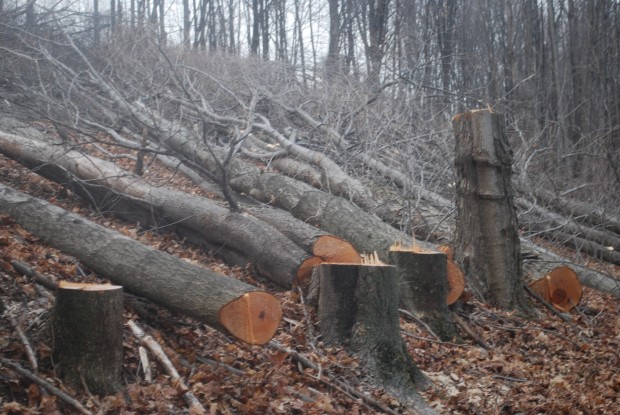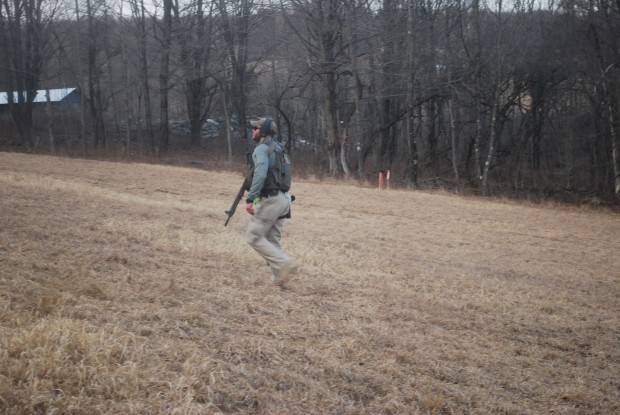Williams delays construction of Constitution Pipeline
-
Jon Hurdle

Jon Hurdle
Fallen maple-syrup producing trees on the Holleran property after cutting. The trees were recently cut to make way for the Constitution Pipeline project, which has been delayed. The trees were cut before the maple syrup was tapped.
Updating with comments from critics, Sunoco
Construction of the controversial Constitution Pipeline to carry natural gas from Pennsylvania to New York State has been delayed by about six months because its developer, the Williams Companies, is unable to complete tree cutting by a March 31 federal deadline that is designed to protect migratory birds, the company said on Thursday.
Williams said it now expects to have the pipeline, the first that would carry natural gas directly from the Marcellus Shale to New York and New England, in service by the second half of 2017 compared with its previous target of the fourth quarter of 2016.
“The in-service date adjustment is in response to the rapidly closing environmental window to complete tree-felling activities prior to March 31,” the company said in a statement. It said it has completed “nearly all” tree felling on the Pennsylvania section of the pipeline route.
The pipeline has drawn opposition from critics including landowners in Pennsylvania’s Susquehanna County who argue that Williams has no right to use eminent domain to take land for construction in cases where individuals have refused offers of compensation.
Progress on the line has already been delayed by the fact that it has not yet received a water-quality certificate from New York State, and another from the U.S. Army Corps of Engineers.
Williams said it could proceed with “limited” construction this summer in areas where trees have already been felled, and at stream crossings, but that full construction can’t be resumed until Oct. 1 when the federal government lifts restrictions on cutting trees during bird migration. The limited season for tree cutting is also designed to protect the long-eared bat, a threatened species.
The company says the 124-mile pipeline would help to ease a shortage of pipelines to take abundant natural gas to market from Pennsylvania’s Marcellus Shale, and would reduce prices for customers in New York and New England.
“The Constitution Pipeline will help address pipeline infrastructure issues that have exposed New England and New York consumers to less-reliable utility services, higher-than-average natural gas prices, and significantly higher electric-generation costs,” Williams said in its statement.
Christopher Stockton, a Williams spokesman, denied a claim by opponents that gas to be carried by the pipeline is destined for export markets, which could undermine the company’s use of eminent domain in some parcels along the pipeline route.
“This gas will be delivered to consumers in southern New York, along with markets served by the Iroquois and Tennessee Gas pipeline systems in New York and New England,” Stockton told StateImpact. “This is the first direct path linking the Marcellus basin with New York and New England consumers.”

Jon Hurdle / StateImpact PA
An armed U.S. marshall on his way to accompany two tree cutters at the Holleran property on Tuesday, March 1 2016.
Stockton said the project had been approved by the Federal Energy Regulatory Commission, which regulates interstate pipelines, and which denied challenges to the project in January this year.
Although it has not obtained all the necessary permits, the company has been cutting trees to make way for the pipeline on some properties in Susquehanna County. This includes land owned by the Holleran family of New Milford Township where about three acres of syrup-producing maple trees were felled on March 1 and 2 after the family lost a challenge to the company’s eminent domain assertion in 2015.
The family member, Megan Holleran, said the construction delay vindicates her argument that the tree felling was premature.
“It proves that I was right when I said it was completely unnecessary for them to do this at this time,” she said. “It’s proof of how stupid it was that they came out and cut our trees already.”
She said the company had argued that it needed to cut the trees now to meet the March 31 deadline, even though it didn’t have all the permits it needs to begin construction.
“I asked them to wait because I knew they weren’t going to meet the March 31 deadline,” she said. “If they had a little more foresight and had been a little bit more reasonable, I wouldn’t be in the situation right now where I’m not going to be able to produce any syrup from those trees.”
Holleran said she now hopes to pursue a legal battle against Williams. She said the family could file suit on the basis that Williams has damaged the family’s maple-syrup business without compensating it, and that the company had made a “disproportionate show of force” by having U.S. marshals armed with semi-automatic firearms present at the recent tree cutting.
After the announcement of a delay to construction, Pennsylvanians Against Fracking, which represents about 100 environmental groups, institutions and businesses calling for a halt to fracking in the state, urged Gov. Tom Wolf to deny permits to builders of interstate pipelines that have not received all the necessary permits, and which would hurt natural resources or local populations.
The group also asked Wolf to reject two kinds of state permits on water crossings and erosion that are still required by Sunoco Logistics for construction of its Mariner East 2 pipeline that would carry natural gas liquids some 350 miles from western Pennsylvania to the Marcus Hook terminal near Philadelphia.
It called the Constitution Pipeline “unnecessary”, and said the announcement of a delay to construction showed that the tree cutting on the Holleran property could have been avoided.
“Williams’ announcement makes clear that the family’s business could have been spared for at least another year,” the anti-fracking group said in a letter sent to Wolf on Friday.
Jeff Shields, a spokesman for Sunoco Logistics, confirmed that the company still needs to obtain state permits 102 and 105, covering earth disturbance and water crossings, respectively.
Gov. Wolf on Thursday welcomed completion of Mariner East 1, the first phase of the cross-state pipeline project, saying it marked a first step in directing Pennsylvania’s natural gas resources to industrial uses within the state.
The governor’s office did not immediately respond to a request for comment on the letter from the anti-fracking group.
















